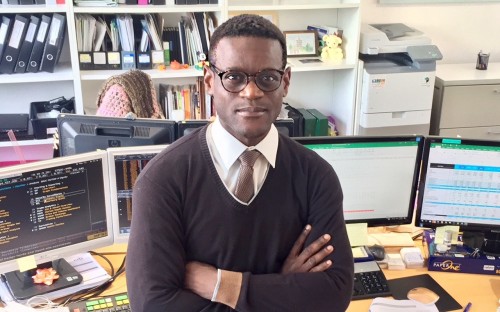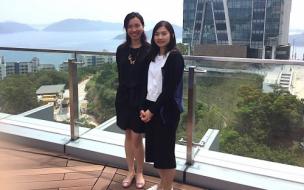As the portfolio manager for an Asia-focused hedge fund, he analyzes huge silos of data to make the best decisions and find the best investment opportunities, mostly in the technology space.
Prior to his current role, Frantz worked for over a decade for top finance firms like JP Morgan. But, he says, he wouldn’t be where he is today without an MBA from the University of Hong Kong (HKU).
10 years after leaving France for Asia, Frantz went for the part-time MBA at HKU to challenge himself, refocus his career, and go after the portfolio manager position he’d always wanted. At HKU, Frantz was able to customize his MBA experience to match his career goals—taking investment management and data science classes and developing his soft skills at the same time.
The hard work paid off. Frantz only applied for one job. After a grueling, 12-month interview process, he got it.
How are you applying your MBA learning in your current role?
I use much of the knowledge gained in finance, marketing, and strategy, on a daily basis. Most importantly, at HKU, we had an introduction to data science module with Dr. Michael Chau.
I learned how to write language for data science and, as of today, most people still see things either from a strictly fundamental analysis or quantitative standpoint in the region, mixing both approaches using data science is fairly new.
That’s something I’ll be forever grateful to HKU and Dr. Michael for. You always hear about big data, but Dr. Michael actually helped us put big data into practice. He made something quite technical easier to digest, and he made it interesting—all the examples and exercises we did were related to our real-life work.
How else have you profited from your HKU MBA experience?
Without the MBA, I don’t think I would have got my post-MBA job.
When you’re applying for jobs, you’re challenged with different tasks and assignments, and the MBA prepares you for that. Every month and a half, you get a new module, you have to learn new things quickly, and you have to present on what you’ve learned. The MBA gives you that adaptability, and the ability to distance yourself from problems, analyze them, and see them from different angles.
Plus, the fact that you’re willing to invest financially, make a sacrifice, go back to business school for two more years, and learn things again—that says a lot about your personality.
Why did you decide to pursue an MBA?
I found myself in need of a new challenge. I wanted to be an equity portfolio manager, meet and analyse companies, leverage my technology skills and run my portfolio.
So, I needed an understanding, not just of the financial side, but about entrepreneurship, risk management, social and cultural aspects, networking as well—and you can only find all of these together on an MBA.
I’m based in Hong Kong, I’ve always covered Asian markets, and all my contacts are here—so it made sense to be here. I went online, did my research, and I saw that all the big successful corporations in Hong Kong are filled with HKU grads.
The part-time format was also a perfect fit from a financial standpoint, and attending classes alongside work gives you a new perspective on your daily tasks. After joining the program, unlike the stock stories you read on the Internet, I quickly realized that every single candidate had his, or her, unique story. In my first accounting module, I was in the same group as people from the technology industry, law, architecture, professional sports, and the automotive sector, just to name a few.
Why is Hong Kong a good career destination for MBAs?
People are more accessible here than anywhere else in the world. You could easily at a social event in Hong Kong and be sitting next to a CEO or VP of a major multinational company. You can engage in a discussion, and he or she will respond to you.
That sort of thing would seldom happen in other countries. Here, it happens every day. A lot of people come over here with just a suitcase, and a few weeks later they find a job.
All you need to do is demonstrate energy, commitment, and discipline. And don’t just throw your resume at people. Be very clear on what you want to do with your career, and have a proper execution plan. As long as you tick the right boxes, people are very willing to give you a chance.
RECAPTHA :
58
4d
50
52









